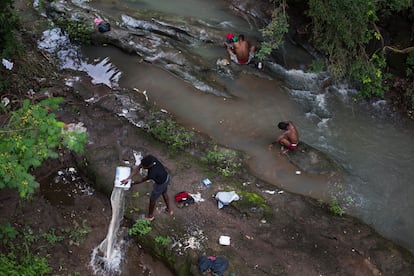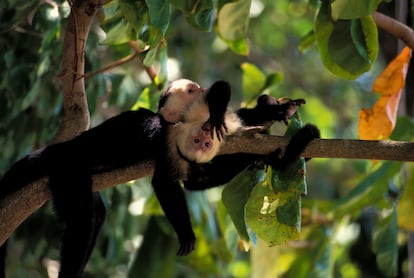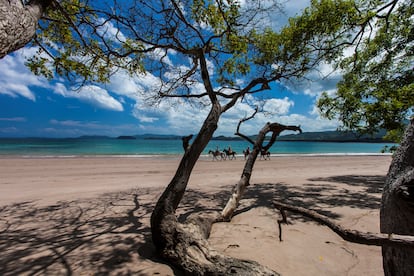Why Costa Rica is struggling to maintain its environmental reputation
The status of sustainable country is facing long-overdue problems, priorities disrupted by the pandemic and the economic crisis, and a new government that creates confusion among conservationists

“Times are difficult, so we will do it slowly, but surely… at the pace that global conditions allow, not sacrificing too much of the current well-being for a distant future; but not sacrificing the future for an immediate profit, either.” This is what Rodrigo Chaves, president of Costa Rica, stated on May 24 at the World Economic Forum in Davos, on his first trip since taking office after winning the elections as an advocate of significant changes in a small Central American country that is known for its environmentalist tendencies. This was his answer to a question about the environmental proposal of his incipient government before other public officials and investors who supposedly value more and more the profile of sustainability of their destinations.
He went on: “In Costa Rica, we are facing historical challenges regarding the management of our river basins. We have invested very little in sewage systems and we have too much pollution. We will work on that. Regarding solids management, we are not recycling, we don’t have enough of a circular economy.” Chaves was not lying as he pointed out serious and long-standing problems that hide behind the facade of the international awards won for the environmental results of the last 40 years and the applause received by the plans against climate change of previous governments.

The global economic moment is not easy for the environmental profile of the country, and Chaves is part of the moment. Even though he questions the profitability of an eventual oil exploration in Costa Rica, he pushed back the efforts of the previous government to forbid this activity by law. He sees the exploitation of natural gas as acceptable. He ruled out promoting the ratification of the Escazú Agreement, an international treaty signed in 2018 in Costa Rica for the protection of environmental activists, with the support of the United Nations. He works with the explicit support of business chambers that prioritize the “economic reactivation” – a concept that has been repeated like a mantra after the pandemic hit. Electric mobility is not on his to-do list. The unemployment rate of 12% is one of the highest in the region, and Chaves will not compromise the present for the future, as he said in Davos.
Environmental sectors see confusion. Others believe that it is still early to judge the government’s environmental side, but they recognize the lack of promising signs. There are not many clear criticisms from leaders of the environmental sector, NGOs or authorities of the recent past. No one wants to get into public quarrels with the government. Henry Picado, spokesperson for a group of environmental associations called the Costa Rican Federation for Conservation (FECON), says that perhaps there is a lot of caution, as well as satisfaction from the sector that Minister Franz Tattenbach comes from (private forestry), and expectation for what the new government will bring, besides some improvisation that they have noticed.
Meanwhile, a conservationist group called the Green Block attributes an “authoritarian drift” to the government due to a plan for a legal reform that would take away from citizen groups (academic, social or scientific) the right to participate in the decision-making process of the Ministry of Environment. It “concentrates the power in the figure of the minister, which calls into question the will of the Executive Branch to strengthen the democratization of environmental governance,” states the organization. It also warns about possible sources of conflict in a country where nine out of 10 Costa Ricans support the idea that the post-pandemic economy must recover hand in hand with the environment, but only two out of 10 have actively participated in community actions on climate change, according to a survey carried out by the local United Nations headquarters in 2021.

Other groups still await the appointment of a vice minister in charge of water and oceans (91% of the country’s surface), a position created in the last decade, in line with recent trends in protecting water resources and life on the coasts and in oceans, like the two that flank the Central American isthmus, particularly vulnerable to disruptions due to climate change. The minister, Franz Tattenbach, an economist with experience in protecting terrestrial national parks, has already hinted that he would see fit to lift a current ban on fishing by dangerous bottom trawling methods.
Even so, renowned environmental voices prefer not to sound the alarms yet, aware that other problems have been present for years. Although 99% of electricity production comes from clean sources, 75% of total energy expenditure goes to imported fossil fuels, due to a number of vehicles that, by proportion per capita, is the third highest in Latin America. Numerous diagnoses and experts also point out deficiencies in urban growth, in the use of agrochemicals and in the pollution of rivers, as Chaves openly said in Davos.
Costa Rica is still better positioned than the international averages, although its own trend is unfavorable: between 2011 and 2022 it fell from 5th to 68th place among 180 nations assessed in the Environmental Performance Index, a measurement carried out by researchers from the universities of Yale and Columbia, in the United States. The country ranks 167th in recycling and 157th in managing the concentration of nitrogen in the soil, associated with fertilizers. Among the nations of Latin America, however, Costa Rica retains the third best overall position, only below Cuba (60) and Chile (65).
The 2021 report from a think tank and research center of the state universities called the State of the Nation Program concedes that the environmental strengths are extensive. It attributes this to decades of public initiatives, and private and civil society participation, in addition to various ecosystem management plans. This can be confirmed by the thousands of foreigners who support the ecotourism industry and the 93% of the population who have access to drinking water by simply opening the tap at home. The risks, nonetheless, are just as obvious.

“Despite the fact that internally the challenges are profound and the situation is serious in many agendas, it is undeniable that, comparatively, recognition was obtained regarding the progress made in conservation. It is imperative to take care of what has been built and, above all, define informed and precise policies that counteract the risks. The current context, marked by the Covid-19 pandemic and the deep crisis that it has generated, has become a breeding ground for the return of anti-environmental discourses, and the generation of new tensions that favor the neglect or the unsustainable use of protected natural resources or of the recovered coverage,” declares the State of the Nation Report from 2021.
That same report forecasts that the trend of urbanism and agricultural development will cause a loss of tree coverage of more than 500 km2 (1.4% of the current surface) in 2025, particularly in areas of agriculture and a larger social gap, despite the constant remarks of Christiana Figueres, the international reference against climate change from Costa Rica, who tirelessly points out that the country’s development opportunities reside precisely in those particular environmental conditions.
Tu suscripción se está usando en otro dispositivo
¿Quieres añadir otro usuario a tu suscripción?
Si continúas leyendo en este dispositivo, no se podrá leer en el otro.
FlechaTu suscripción se está usando en otro dispositivo y solo puedes acceder a EL PAÍS desde un dispositivo a la vez.
Si quieres compartir tu cuenta, cambia tu suscripción a la modalidad Premium, así podrás añadir otro usuario. Cada uno accederá con su propia cuenta de email, lo que os permitirá personalizar vuestra experiencia en EL PAÍS.
¿Tienes una suscripción de empresa? Accede aquí para contratar más cuentas.
En el caso de no saber quién está usando tu cuenta, te recomendamos cambiar tu contraseña aquí.
Si decides continuar compartiendo tu cuenta, este mensaje se mostrará en tu dispositivo y en el de la otra persona que está usando tu cuenta de forma indefinida, afectando a tu experiencia de lectura. Puedes consultar aquí los términos y condiciones de la suscripción digital.








































